Really really light (except for all the death)
Top 10 part 2, on Deja Voodoo, Gena Rowlands, and other Weirdos
Last time, writing about the Jackie Shane doc Any Other Way, I said it glossed over the “mystery” of why Shane had left Toronto for L.A. in the early 1970s. Turns out if I had read Rob Bowman’s liner notes to Numero Group’s 2019 Shane reissues, I’d have had the solution: Basically a dispute with Shane’s longtime former bandleader Frank Motley had started turning dangerous. Bowman’s account is the fullest I’ve seen, and doesn’t scant Shane the musician for Shane the early gender radical, nor the relationship between the two. Questions remain, likely never to be answered, as in any life.
Also: The biweekly online Popular Music Books series I co-organize launches a new season on Tues., Sept. 10. Check out our whole calendar, including me Sept. 24 talking to music-data expert (and ex-Spotify staffer) Glenn McDonald about You Have Not Yet Heard your Favorite Song, and many more. To get on the list for Zoom links etc, write eric.weisbard@gmail.com.
Now, we rejoin the program already in progress. Pardon the length. The future plan is to get more frequent and more compact.
KEELE LIFE TOP TEN, AUG. 2024: PART 2
(mostly wistful edition)
(I currently live on Keele Street in Toronto; format borrowed in tribute and with apologies to Greil Marcus; Part 1 is here.)
6. Tony Dewald of Deja Voodoo, d. Aug. 29
A Facebook post the other day from Gerard Van Herk—guitarist and lead singer of 1980s Montreal “sludgeabilly” duo Deja Voodoo—announced that his former musical partner, drummer Tony Dewald, had died peacefully at home after a long bout with cancer. Dewald would have been in his early-to-mid 60s, I estimate. Too young. Not young like many recent hip-hop deaths; think how fans of Atlanta’s Rich Homie Quan, dead this week at 34, must be feeling. But too young still.
When I got to the Montreal music scene in the mid-late-80s, it was fully Deja Voodooville, its central rite the famous Deja Voodoo BBQs, full-day extravaganzas with free food, cheap beer, and heaving smorgasbords of bands. Many of those (the Gruesomes, Condition, Jerry Jerry) were part of Dewald and Van Herk’s stable at Og Records. Og also released the It Came from Canada compilation series, which helped imbue Canadian independent music (garagey division) with a national identity.
Witnessing that network helped flesh out my fantasies of what a cultural underground might be like, a community foremost, where “punk” didn’t mean nihilistic aggro but goofy generosity, rewarding not pecuniarily but with peculiarity. You could have a worse life model. As that secret punk Wallace Stevens put it: “Out of this same light, out of the central mind,/ We make a dwelling in the evening air,/ In which being there together is enough.” Which Deja Voodoo summarized and blended with the Beatles in “Things With You,” in stunned-caveman voices with a guitar missing its treble strings and a drumkit without cymbals: “I saw you standing there/ You saw me standing here/ We saw each other/ Standing here and there.”
What else did you need? As the official “Voodoo BBQ” anthem declared, “They bring their clothes, they bring their hair.” After the band retired in 1990, Van Herk became a linguistics prof (obviously he already liked stripping language down to its base components), while Dewald became an award-winning craft brewer (obviously he already liked DIY enterprises and beer). I hope Dewald enjoyed that second act in direct proportion to how much he’d enriched circles within circles of people spiraling out from the centrepoint called Og like the grooves of a record. Their 1985 EP title stands up, in spite of all: Too Cool to Live, Too Smart to Die.
Billboard’s obituary is here. If you’re looking for the music, please note that except YouTube it’s mostly not on streaming, where you’ll find several more recent bands called Deja Voodoo that are terrible.
7. Gena Rowlands (d. Aug. 14) in An Early Frost (1985)
Shortly before Gena Rowlands died last month, I coincidentally had an argument with a friend about her husband and longtime collaborator John Cassavetes, or more specifically about the Le Tigre song “What’s Yr Take on Cassavetes?” (“Genius! Misogynist!” “Messiah! Alcoholic!”). My friend argued that it was sad the band felt it had to waste its time arguing about this toxic man, and I lost my temper in an uncharacteristic way, which puzzled me after. Partly it seemed condescending to Le Tigre to tell them what to care about. But of course this was also something I care about, and my agitation reminded me how much. Especially about his films with Rowlands at the forefront, such as Opening Night, A Woman Under the Influence, and Love Streams. I don’t deny that these films marinate in toxic masculinity (though not just that), but it’s much more knowingly than in so much 20th century art by the stereotypical dysfunctional geniuses.
Not that such knowingness is requisite, but it feels ironic that by foregrounding it and making it so much their subject, these independent filmmakers attract disproportionately more criticism than the mundane unrelenting masculinism and misogyny of the same era’s mainstream Hollywood film (and much of it now). I understand if you don’t consider such an immersion very entertaining, of course. But their films confront the noxious traps for the women and men of heterodom (which admittedly to them was pretty much all of life) with stark frankness. Still partial, and mannered, and constructed, like all attempts at naturalism. But with a scorching sense of the search for some kind of truth on the matter.
I think of those films as the flip side of the screwball comedy, which satirized straight coupledom as a vehicle towards a dreamily utopian revision of it, via inversion or what some might now call queering. By Cassavetes’ and Rowlands’ more disillusioned era, such stratagems were worn out and, like their contemporaries in second-wave feminism (though on a different track), they had to go at the task more directly. Had Cassavetes been a more autocratic and less humanistic director, if he had not (as an actor himself) been obsessed with making space for actors to sound out their own truths, and if the woman at his side hadn’t happened to be one of the greatest actors of her age, the results might not have been nearly so incandescent. But he was, and she was, so they were.
Still, I thought after Rowlands’ death at 94 (sad but only so sad, as she’d had dementia and other conditions for years) that instead of revisiting one of those milestones, I’d seek out one of her performances in non-Cassavetes material. Which reminded me I’d never seen the historic 1985 NBC-TV movie An Early Frost, pretty much the first mainstream American work about AIDS in any medium (easily found now on YouTube). Predictably, its lens was the nuclear family. Rowlands and fellow Cassavetes regular Ben Gazzara play the parents of Aidan Quinn’s closeted hotshot young lawyer. Struck by the virus just as he’s made partner at his firm, Quinn fights with his Chicago boyfriend and goes back to the suburban homestead, finally forced to come out to his family.
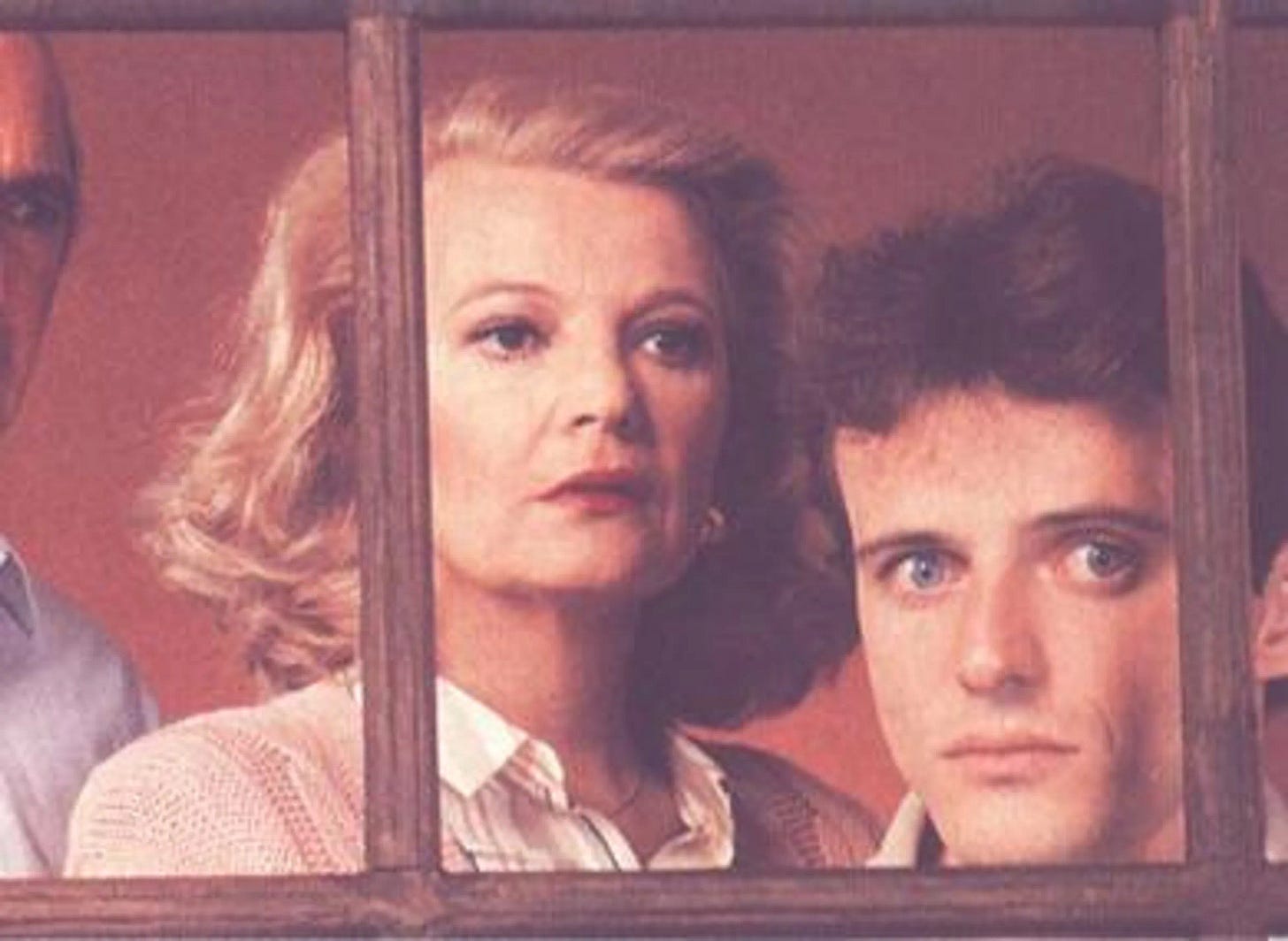
Gazzara’s shift from violent patriarchal rejection to acceptance is the heaviest plotline. He ultimately unites with his family against the disease as the greater enemy, a concession much of America will later be dragged towards as well, with lasting consequence. But Rowlands, as caretaker of this collapsing structure, has to go before and illuminate all the available corridors, for her own character and then for her stubborn husband, her frightened daughter, in a sense the son too. Transitioning from deflective fear to a porous embrace—soon extended to the more flamboyant and in extremis patient Quinn befriends in hospital, later the visiting boyfriend, thusly to gays in toto1—Rowlands makes of herself a transparent cell, a silvery surface heaving and rippling as the tides beneath surge and retreat.
Another actor might have made the mother too tranquil and saintly. Rowlands—as always fulfilling Artaud’s charge to the actor2—never lets you forget she is burning. She is tied to the stake of her son’s suffering but also her previous shameful ignorance, which is also her nation’s and, when held in Rowlands’ person, always also our own, no matter what we think we know.
8. The New Pornographers at the CNE Bandshell, Aug. 24
I’ve seen the New Pornographers3 many many times, but never, I think, without Dan Bejar (a.k.a. Destroyer). We’re old family friends, so for a couple of decades I’d just see the NPs when he was on board, not other times they cruised through. I’m used to a show alternating between a handful of Carl Newman songs and Dan coming out of the wings to lead one of his own, taking a semi-ironic bow and retreating again. (In the old days he would be drunker with each iteration, his bows increasingly deep and supplicant like a silent-film-slapstick routine.) When Neko Case was also along, the band was a triple-headed chimera, and that variety-show feel was their best trick.
So when a friend wanted me to come to their Bejar-and-Case-free summer tour, it was an adjustment to getting an almost-all-Newman repertoire. Variations came when Kathryn Calder took lead—she should do it more—and she was winningly joined on backup for the first time on the microphone by the much younger singer-songwriter Al Olender (though they neglected to introduce her and it took me a few days to find out her name). Still, compared with neighboring Lake Ontario venue the Glug Glug Corporate Amplifier, the CNE Bandshell is an idyllic place for a show en plaine air on a summer’s eve. Very human-scaled, with familiesful of casual expositionists wandering in, the occasional dancing child in a polka-dot dress. Once I adapted, I got to appreciate the band in fresh ways.
Carl’s cutely awkward banter, for instance: “We want to congratulate this next song for the Guinness record for Most Brutal Guitar Solo Ever Recorded…. Uh, ‘brutal’ in like a good way.” (“The Jessica Numbers.”) Or commending us on our Olender-led participation in the “very specific clapping pattern” of “Sweet Talk, Sweet Talk”: “What do they say? Teamwork makes … you can’t spell ‘team’ without … the teamwork makes the friendship go!” The set had 10 songs from the classic 2000s era and six each from the 2010s and 2020s, so I got to know some newer tunes I’d previously neglected. Among others, “Really Really Light” from last year’s Continue as a Guest went into rotation on my mental jukebox, with its supple power-pop chorus, “We sit around and/ Talk about the weather/ My heart’s just like a feather/ Really, really light.”
I looked it up when I got home, and along with its rather lovely video I discovered … that it’s the one song on that album co-written by Dan. D’oh! (You can hear it in how Carl spits out the T in “sit around.”) Plus ça change, plus c'est la même chose with me, I guess.
9. V. Vale of RE/Search in Toronto, Aug. 23
So much nostalgia this month, as if anticipating the browning of the leaves. Still, if you were a young alterna-something around the turn of the 1980s-90s, anywhere in North America as far as I can tell, you’d be aware of the RE/Search books: Incredibly Strange Music Vols 1 and 2 (which mostly presaged the lounge-exotica revival); Angry Women (with Kathy Acker, Annie Sprinkle, bell hooks, Karen Finlay et al); Modern Primitives (about body modification); Zines!; Pranks!; and The Industrial Culture Handbook (featuring Throbbing Gristle, SPK, Monte Cazzazza etc).
Growing out of the Search and Destroy punk zine that launched in 1977, RE/Search (you see the connection) has gone on publishing out of San Francisco ever since 1980, headed by V. Vale, who I imagined as an enigmatic and glamorous figure of indeterminate gender perpetually lounging in an opium den with J.G. Ballard and William S. Burroughs and the giant dino-machines of Survival Research Laboratories.
One weekend in mid-August, after several attempts scuppered by the lingering pandemic etc, Toronto’s Charlie Huisken—of the late great Toronto bookstore This Ain’t the Rosedale Library—brought Vale and collaborator Marian Wallace to town for a series of events. (Thank you, Charlie!) On short notice I made it only to the first one, with a sold-out crowd at little alleyway venue Cinecycle, a venerable underground institution in its own right. I came late and had to stand, as they screened an hour or so of videos featuring many of the abovementioned subjects. I was a bit impatient—surely we all know this stuff or we wouldn’t be here? But that might not have been true for everyone, and maybe my joints were just aching anyway, and after awhile it felt galvanizing to revisit that uncompromising zone, almost another world now.
In the Q&A afterwards, Vale—first name “Val” apparently—was startlingly genial, while a bit vague on RE/Search’s operational history (for the sake of mystique, or faded memory?). What he repeatedly stressed was simply to pursue the people and things that interest you, no matter if they intimidate you. Why were we listening to him, in fact, when we should be chatting with all the others in this room, who must have so much in common?
I slipped out then, like a real Toronto fink. But I did discuss the RE/Search mythos with friends after: Exactly when was it so eclipsed by internet culture that it lost its aura? Even some friends in their early 40s shrugged at the name. Not hardcore culture nerds, but people who’d definitely know it if they were a few years older. And surely internet culture itself would not have been the same without this godfathermother of zine culture, Burning Man-nerisms and such? Prophets without honour in their own etc etc. Your speculations welcome.
10. Weirdos (Bruce McDonald, 2016), seen Aug. 11
When I tried to tell people why I winced at Democrats weaponizing “weird” against Republicans this summer, why its very effectiveness mirrored Trump’s bullying in a way I couldn’t help taking personally, I should have showed them this movie. It’s not about weird being cool. It’s about making peace with your weird just to survive it, and how badly you need others to do so too. Weirdos is only eight years old but feels older, so convincingly is it set in 1970s Nova Scotia and a whole other social state of mind. It’s so modest it’s no wonder I missed it for eight years. With a script from Sydney-born Daniel MacIvor, Toronto director Bruce McDonald returns here to his early specialty, the coming-of-age road movie (Roadkill, Highway 61), but with even younger protagonists: a teenaged couple who are about to figure out why they’re not sleeping together.
The trip undoes Kit (Dylan Authors) from his obtuseness about his own sexuality, in a time and place where no one else has language for it either—thus “weirdo,” which is about that, but not only that. (A fantasized Andy Warhol shows up to nudge him along, an unreliable spirit guide a la William Knifeman in Reservation Dogs; it almost works.) Kit’s naive-cum-willful denial extends to other truths in his family, as sequences with Molly Parker as his would-be bohemian mother (at her considerable best here) evoke what it’s like for a kid to realize they’re not safe with an adult they love. Meanwhile, would-be girlfriend Alice looks on with glinting keenness, yearning then resentful then with the dawning empathy and protectiveness Kit desperately needs. (This actor, Julia Sarah Stone, is the one to watch.) It’s one of those teen stories that goes just badly enough to leave you relieved it didn’t go any worse. Typically for McDonald, the period hoser tunes are perfect throughout, but especially Murray McLauchlan’s “Down by the Henry Moore” (right time, wrong province), which broke me down at the end: Don’t you wanna change from losin’? Don’t you wanna have some fun?
Bonus track: Will Jennings, d. Sept 6
Pop lyricist Will Jennings is dead at 80. For Grade 8 graduation, our blond-moustached young teacher had the whole class to his place for a pizza party, and handed out an inky-fresh valedictory ditto of Jennings’ words to Steve Winwood’s “While You See a Chance.” It was cheesy. But he was a really good teacher. Then in my 30s, I wrote a book partly due to another Jennings co-write, “My Heart Will Go On.” So I suppose I owe Jennings for a long line of inspiration … even if I have to agree with Phoebe Bridgers that “we hate ‘Tears in Heaven’.” Requiescat.
…. when we speak the word “life,” it must be understood we are not referring to life as we know it from its surface of fact, but to that fragile, fluctuating center which forms never reach. And if there is still one hellish, truly accursed thing in our time, it is our artistic dallying with forms, instead of being like victims burnt at the stake, signaling through the flames.—Antonin Artaud, The Theater and its Double, 1938 (trans. M.C. Richards 1958)

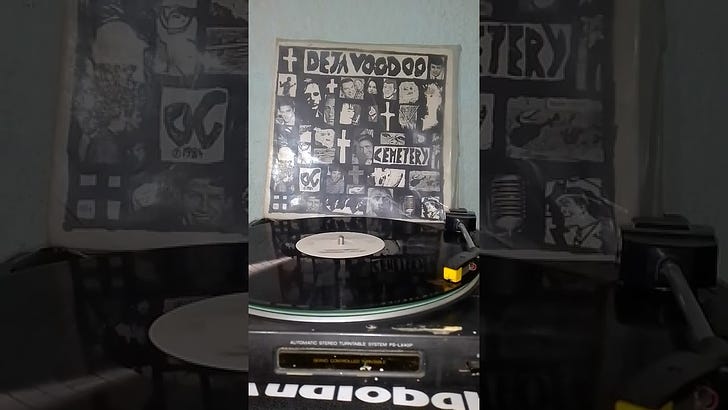

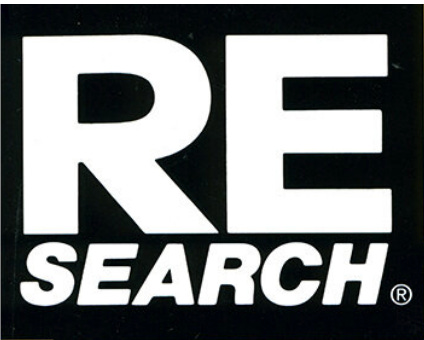
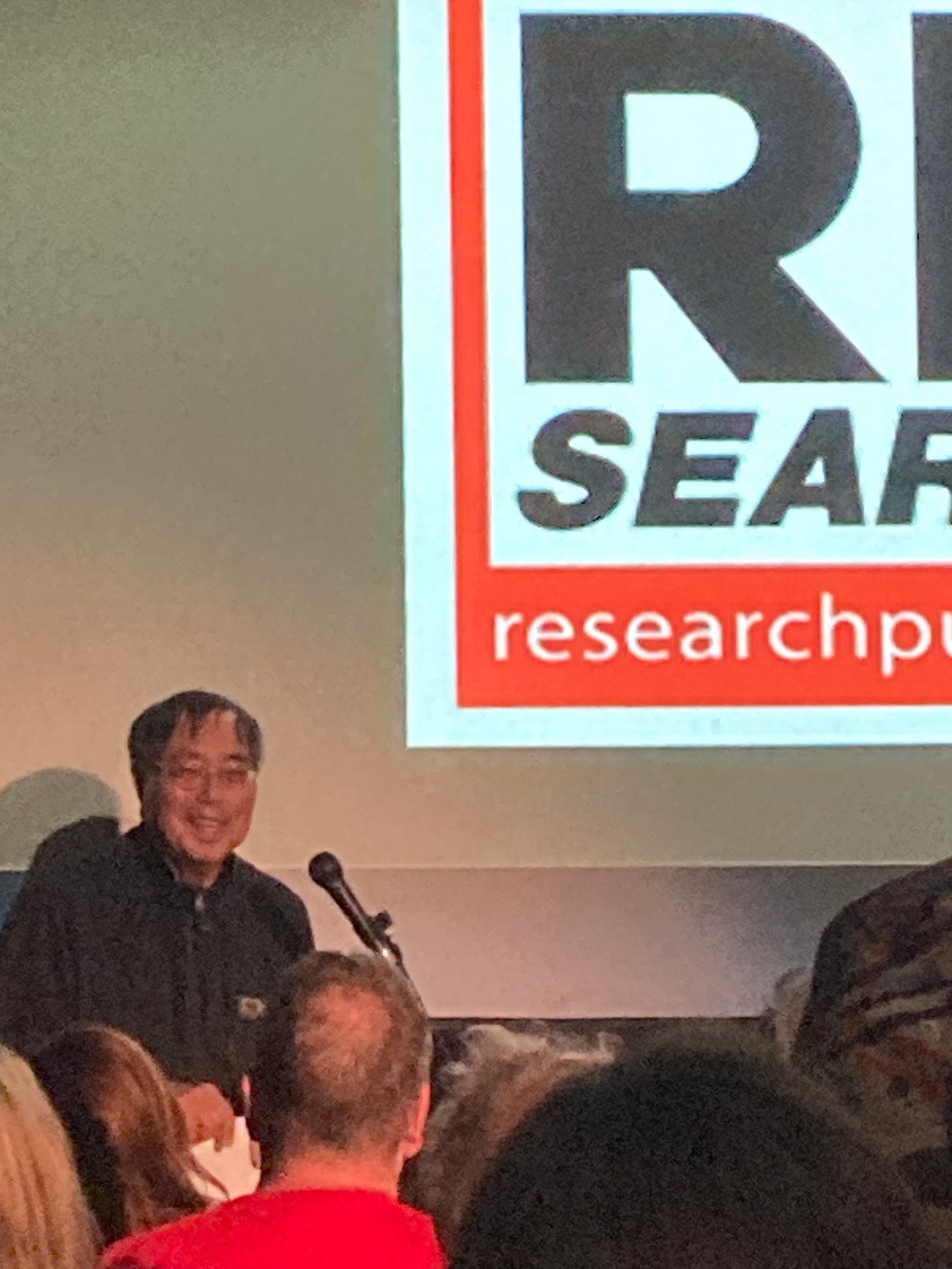
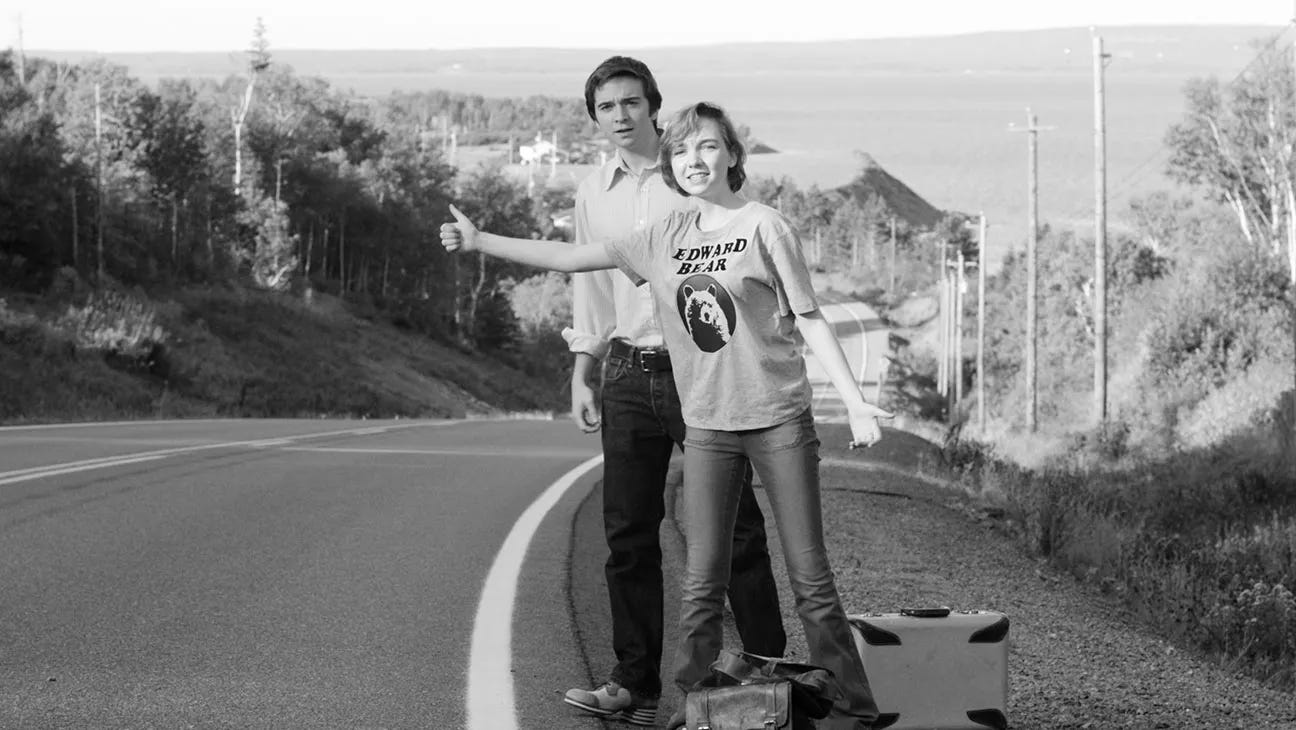
Here’s the song that’s been running through my mind since I heard of Rowlands’ passing: https://m.youtube.com/watch?v=dz4AzGaD508
Yep, Jennings' lyrics were often sappy, and yet... I played his Winwood songs on auto-repeat throughout college. (Perhaps as an antidote to Joy Division. )